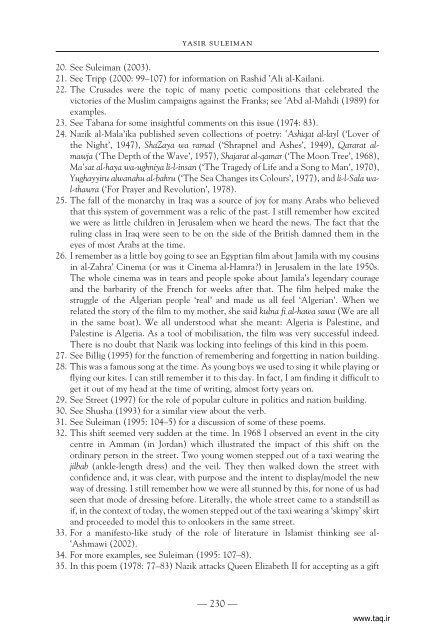LITERATURE AND NATION IN THE MIDDLE EAST
LITERATURE AND NATION IN THE MIDDLE EAST
LITERATURE AND NATION IN THE MIDDLE EAST
- No tags were found...
You also want an ePaper? Increase the reach of your titles
YUMPU automatically turns print PDFs into web optimized ePapers that Google loves.
yasir suleiman20. See Suleiman (2003).21. See Tripp (2000: 99–107) for information on Rashid ÆAli al-Kailani.22. The Crusades were the topic of many poetic compositions that celebrated thevictories of the Muslim campaigns against the Franks; see ÆAbd al-Mahdi (1989) forexamples.23. See Tabana for some insightful comments on this issue (1974: 83).24. Nazik al-Mala’ika published seven collections of poetry: ÆAshiqat al-layl (‘Lover ofthe Night’, 1947), ShaZaya wa ramad (‘Shrapnel and Ashes’, 1949), Qararat almawja(‘The Depth of the Wave’, 1957), Shajarat al-qamar (‘The Moon Tree’, 1968),Ma’sat al-haya wa-ughniya li-l-insan (‘The Tragedy of Life and a Song to Man’, 1970),Yughayyiru alwanahu al-bahru (‘The Sea Changes its Colours’, 1977), and li-l-Sala wal-thawra(‘For Prayer and Revolution’, 1978).25. The fall of the monarchy in Iraq was a source of joy for many Arabs who believedthat this system of government was a relic of the past. I still remember how excitedwe were as little children in Jerusalem when we heard the news. The fact that theruling class in Iraq were seen to be on the side of the British damned them in theeyes of most Arabs at the time.26. I remember as a little boy going to see an Egyptian film about Jamila with my cousinsin al-Zahra’ Cinema (or was it Cinema al-Hamra?) in Jerusalem in the late 1950s.The whole cinema was in tears and people spoke about Jamila’s legendary courageand the barbarity of the French for weeks after that. The film helped make thestruggle of the Algerian people ‘real’ and made us all feel ‘Algerian’. When werelated the story of the film to my mother, she said kulna fi al-hawa sawa (We are allin the same boat). We all understood what she meant: Algeria is Palestine, andPalestine is Algeria. As a tool of mobilisation, the film was very successful indeed.There is no doubt that Nazik was locking into feelings of this kind in this poem.27. See Billig (1995) for the function of remembering and forgetting in nation building.28. This was a famous song at the time. As young boys we used to sing it while playing orflying our kites. I can still remember it to this day. In fact, I am finding it difficult toget it out of my head at the time of writing, almost forty years on.29. See Street (1997) for the role of popular culture in politics and nation building.30. See Shusha (1993) for a similar view about the verb.31. See Suleiman (1995: 104–5) for a discussion of some of these poems.32. This shift seemed very sudden at the time. In 1968 I observed an event in the citycentre in Amman (in Jordan) which illustrated the impact of this shift on theordinary person in the street. Two young women stepped out of a taxi wearing thejilbab (ankle-length dress) and the veil. They then walked down the street withconfidence and, it was clear, with purpose and the intent to display/model the newway of dressing. I still remember how we were all stunned by this, for none of us hadseen that mode of dressing before. Literally, the whole street came to a standstill asif, in the context of today, the women stepped out of the taxi wearing a ‘skimpy’ skirtand proceeded to model this to onlookers in the same street.33. For a manifesto-like study of the role of literature in Islamist thinking see al-ÆAshmawi (2002).34. For more examples, see Suleiman (1995: 107–8).35. In this poem (1978: 77–83) Nazik attacks Queen Elizabeth II for accepting as a gift— 230 —www.taq.ir






